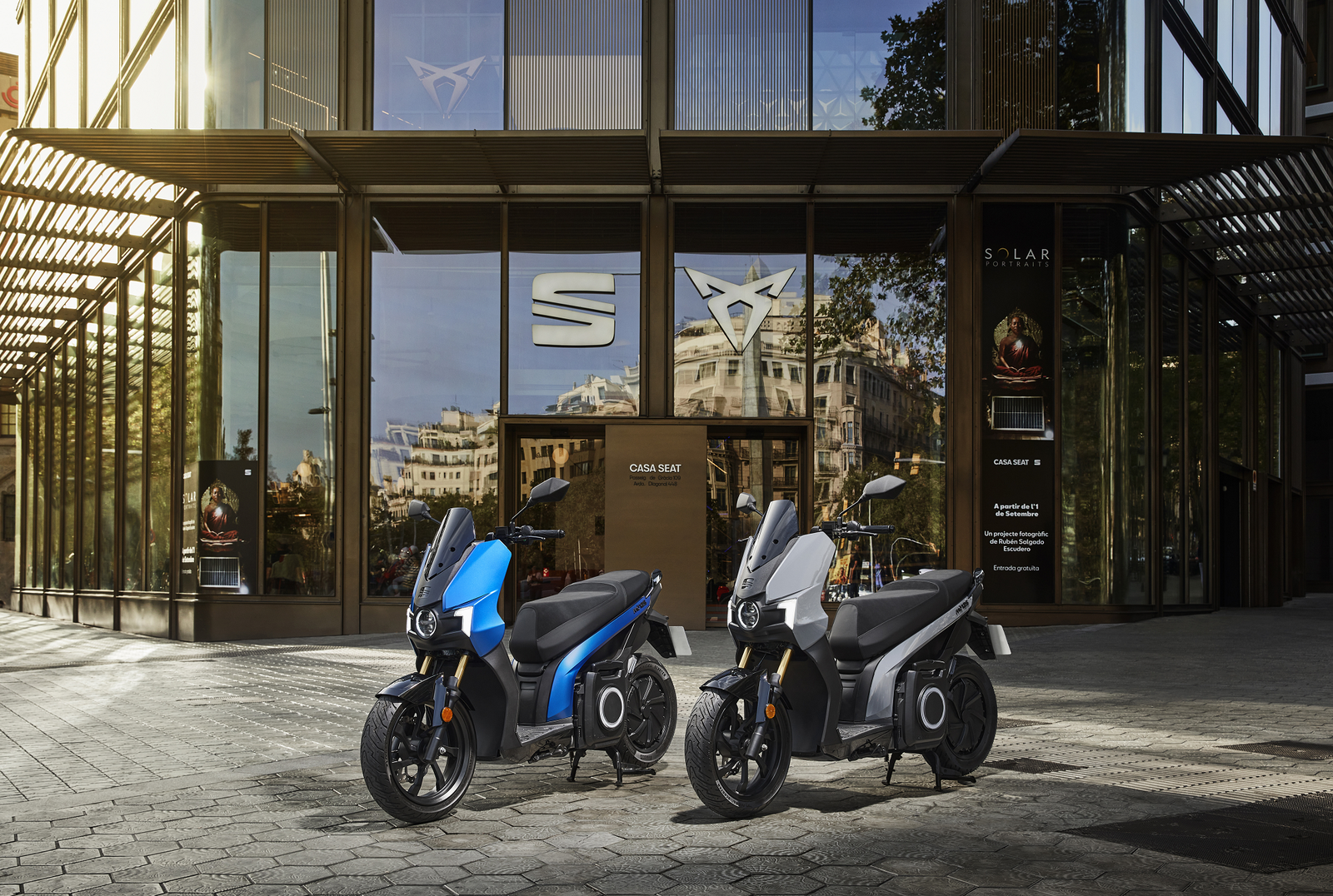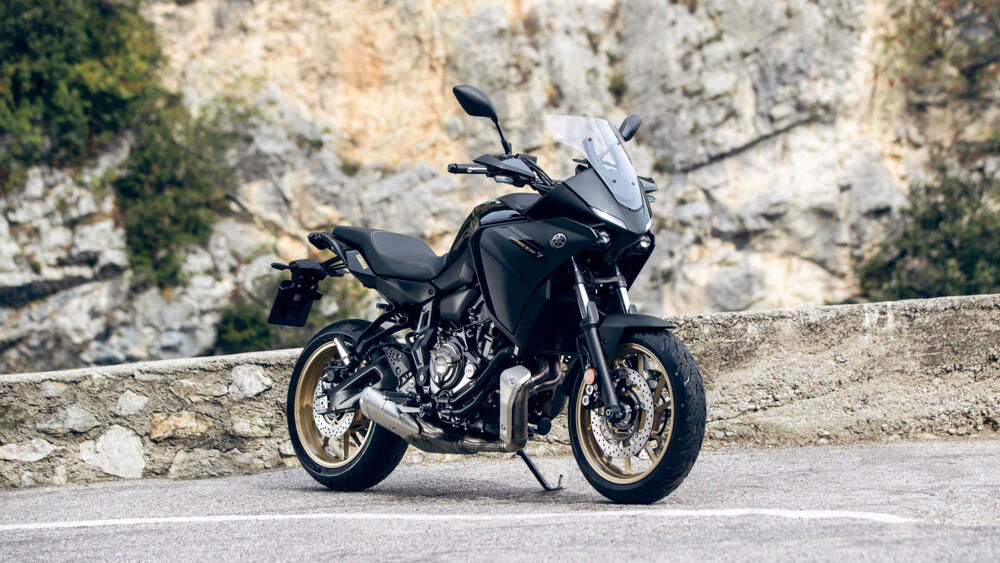2023 Yamaha Tracer 9 GT+ in detail: Radar, integrated electronics headline
The Yamaha Tracer 9 range receives the GT+ model for 2023, which is one of the most technologically advanced Yamahas we have seen.

Yamaha has introduced the Tracer 9 GT+ to the top-end of its sports tourer range for 2023, while the Tracer 9 and Tracer 9 GT also receive minor refreshes.
The main discussion point with Yamaha’s sports tourer range for 2023 - which we summarised on Tuesday - is of course the Tracer 9 GT+ and its new radar-guided adaptive cruise control.
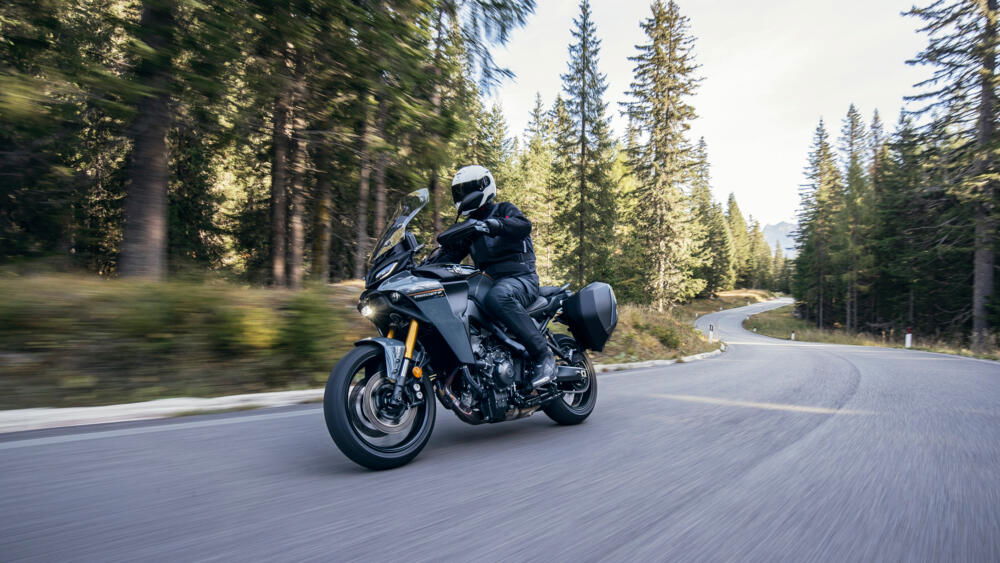
But, it shares features, of course, with the Tracer 9 and Tracer 9 GT, too. The engine, of course, is the 890cc CP3 unit, Euro5 homologated and common across all three versions of the 2023 Tracer 9.
The Tracer 9 and Tracer 9 GT themselves receive new colours for 2023. For the Tracer 9, the “Redline” colour will be joined by the new “Midnight Black”, and for the GT “Midnight Black” is alongside “Pure White”. The 2023 GT also has a homologated exhaust noise of 95dB for 2023. Both the Tracer 9 and Tracr 9 GT will be available from January 2023.
The Tracer 9 GT+, however, won’t be available until May 2023, and won’t be available in “Midnight Black”. Instead, it will come in either “Icon Performance” or “Power Grey”.
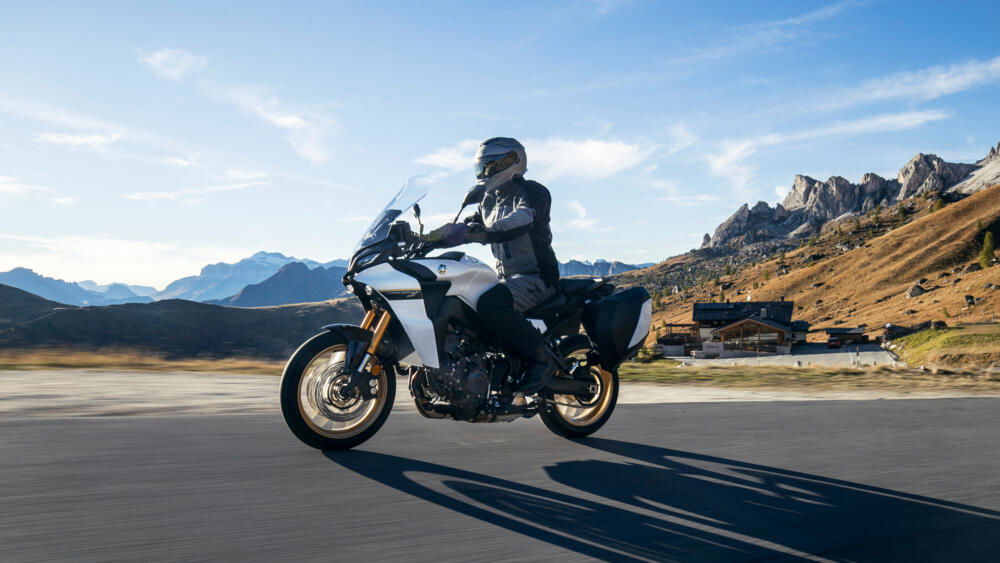
But, the colours are far from the most interesting part of the Tracer 9 GT+, of course, which will become the first Yamaha to be fitted with radar-guided adaptive cruise control (ACC) when it launches in May.
In our summary article of Yamaha’s 2023 sports tourer range, we wrote in some detail about the ACC. It is not the only radar-linked system on the Tracer 9 GT+, as the Unified Brake System is also radar-enabled.
First, we will talk about the ACC. Using millimetre wave radar, the ACC is able to adjust throttle opening and braking forces - with both engine braking adjustments and braking force adjustments at both wheels - to maintain a distance to the vehicle ahead. That distance is adjustable by four levels. These levels are indicated by bars on the seven-inch TFT display. One bar represents the shortest distance, four bars represents the farthest.
The TFT display also indicates when the ACC is active (green) or on standby (grey), and when rider intervention may be required to avoid a collision.
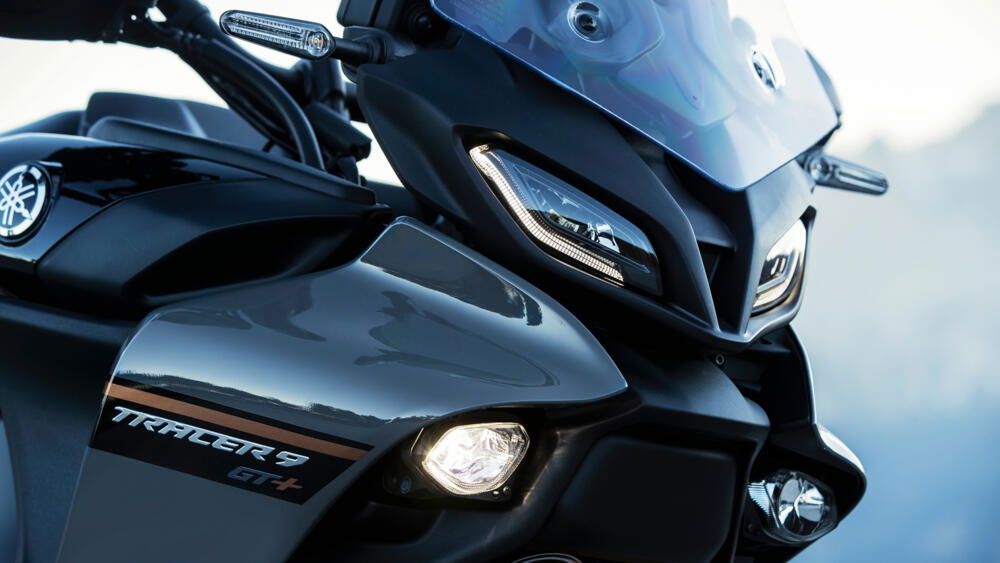
The Tracer 9 GT+’s ACC also features a cornering assist to prevent acceleration mid-corner; a passing assist to grant smoother acceleration when it detects an overtake is being performed by the rider; and can control the electronic suspension to adjust damping in order to prevent excessive pitching when the brakes are being applied.
The ACC will operate between 30kph and 160kph. It is operational in first and second gears from 30kph, in third and fourth gears from 40kph, and in fifth and sixth gears from 50kph. Additionally, it is possible to adjust the speed by pushing on the adjustment switch. Pushing and holding the switch down will increase or decrease the speed by 10kph, while pushing once will adjust the speed by 1kph.
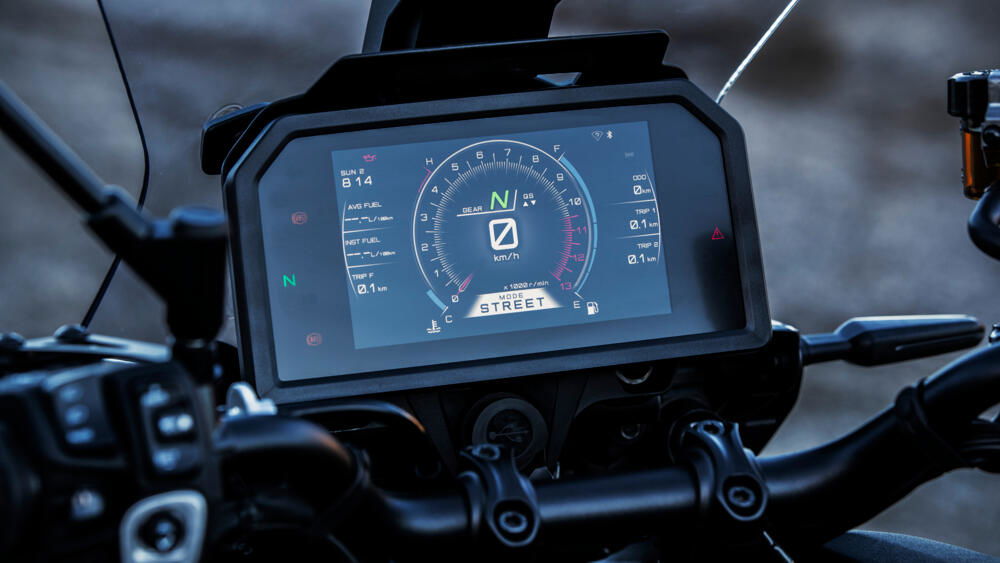
To disable the ACC, the rider can brake, pull in the clutch lever for more than one second, or rolling forward the throttle twist grip beyond the throttle stop.
“ACC offers a number of advantages,” Yamaha says, “including reducing rider fatigue by requiring fewer rider inputs, as well as ensuring improved ride quality by maintaining a constant following distance, and also promoting smooth traffic flow.”
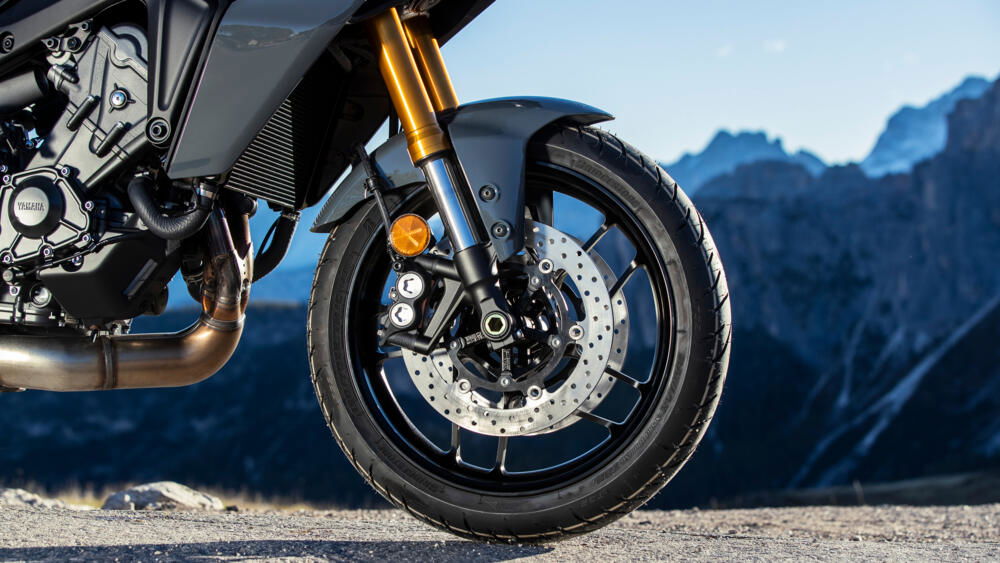
Now we move on to the UBS, which is slightly more complicated and comes with the following note from Yamaha: “The system provides additional braking assistance and will only intervene when the BC is turned ON and the rider is braking – it is not a collision avoidance system.”
The UBS links the front and rear brakes by radar for the first time in motorcycling. The system is also linked into the motorcycle’s six-axis IMU.
Using the information from the radar and the IMU, the UBS is able to “assist and regulate front and rear braking forces,” Yamaha says, and adjust the bias thanks to a hydraulic system from Bosch.
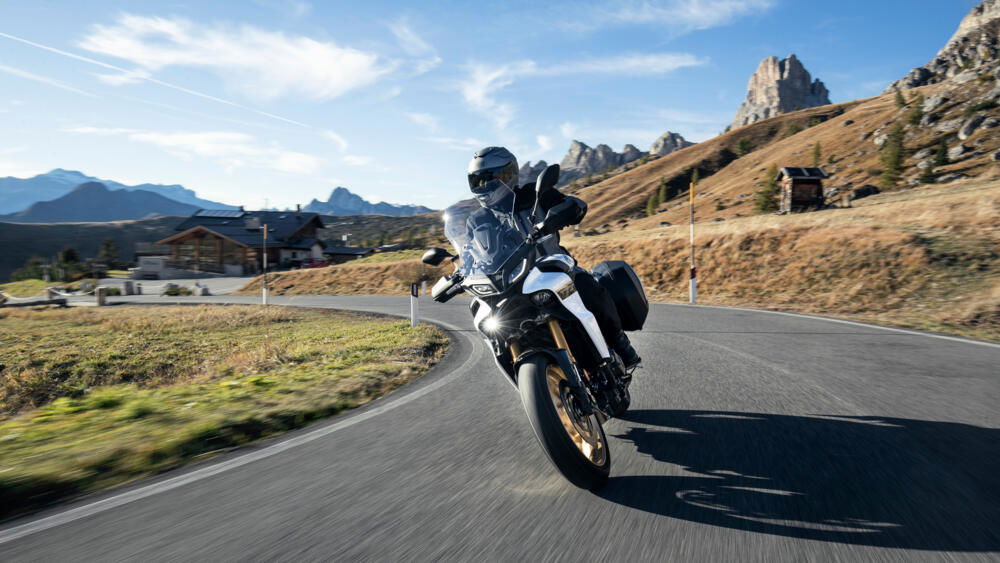
To get the most from the UBS, the motorcycle’s Brake Control (BC) must be turned on. With the BC enabled, the UBS can perform three functions:
- Brake assist - intervention when an imminent collision is detected
- Front/rear brake assist - adjusts braking forces at both wheels for stable deceleration
- Cornering brake control - adjusts braking force to prevent the tyres from slipping while cornering
With regards to the brake assist, the UBS is able to monitor the distance to the vehicle ahead. “If the system calculates that the rider’s braking inputs are insufficient to prevent a collision with the vehicle ahead,” Yamaha says, “it will increase brake pressure to the front and rear wheels to help slow the Tracer 9 GT+.
“The previously described ACC system will also automatically slow the Tracer 9 GT+ when a pre-selected following distance is reached, but as soon as the rider applies the brakes the ACC is deactivated – and at this point the radar-linked Unified Brake System will intervene if it determines that the rider’s braking inputs are not sufficient to prevent a collision.”
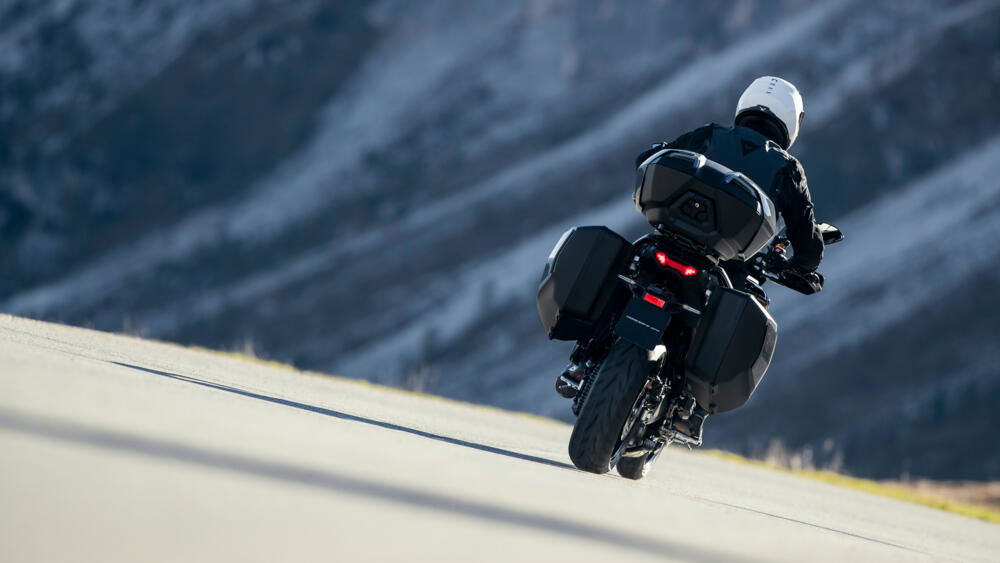
It is important to point out that the UBS will only intervene if the BC is turned on and the rider is braking.
As previously mentioned, the Yamaha Tracer 9 GT+ will feature a seven-inch TFT colour display. The theme is personalisable between three options.
The TFT display will also be the means of connectivity to the MyRide app. Here we find a difference between the GT+ and the other two models in the Tracer 9 range. That is that the GT+ does not come with a USB port with which to make the connection (but there is a USB A port), so instead the connection to the MyRide app will have to be done via Bluetooth or WiFi.
Sticking with electronics, the D-Mode engine character selection on the Tracer 9 GT+ is now fully integrated with the IMU. There are four integrated riding modes, with three preset modes - Sport’, ‘Street’, and ‘Rain’ - and one custom mode. The integrated riding modes now combine the engine character selection, traction control setting, slide control, lift control, and the suspension, which on the Tracer 9 GT+ is electronic.
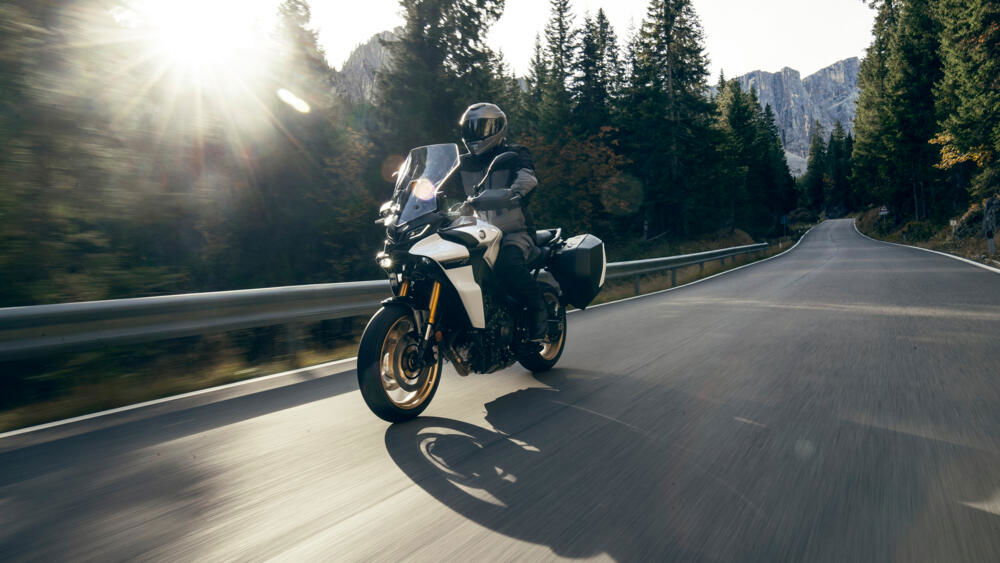
The introduction for 2023 of so many electronic features has pushed Yamaha to revise the ergonomics of the bike. The switch clusters are new, backlit, and now feature a ‘home’ button and a joystick for easier navigation.
Further ergonomic changes include a height-adjustable seat and a new leather-style seat cover material.
Technically speaking, there is a new rear brake for the Tracer 9 GT+, too, with a 267mm disc (9% increase), a new calliper design, a new brake pedal, and new clear smoke reservoirs for both the front and rear brakes.
Sticking with the chassis, but returning to something we briefly touched on previously, the suspension on the 2023 Tracer 9 GT+ is electronic and comes from KYB. It features the KYB Actimatic Damper System (KADS) and has been developed jointly by KYB and Yamaha.
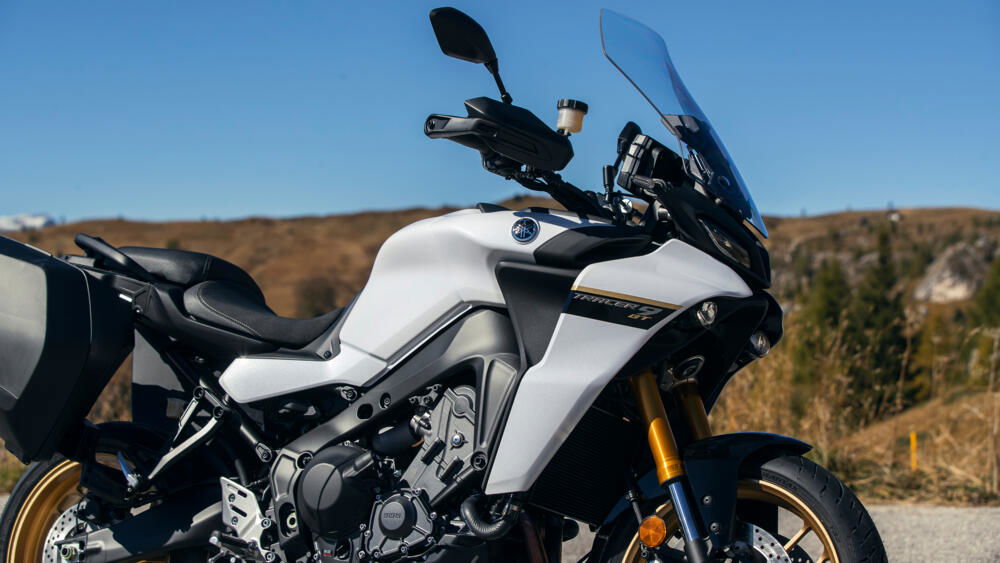
The suspension can be manually set by the rider between “Sport” and “Comfort” modes, while the IMU monitors the suspension and can adjust the damping automatically. Via the IMU, the UBS can also adjust the suspension damping automatically to reduce pitching during braking.
The bike’s frame is die-cast and made of aluminium, and is manufactured using Yamaha’s “Controlled Filling System” which allows for the construction of light frames with varying wall thicknesses to ensure strength as well as optimised flex.
The wheels are also manufactured by a Yamaha-exclusive technology, this time “SpinForge”, which helps to keep them light. In combination with a lightweight swingarm, Yamaha has tried to minimise the unsprung mass on the Tracer 9 GT+.
2023 Yamaha Tracer 9 GT+ Technical highlights:
- New Adaptive Cruise Control (ACC)
- New radar-linked front/rear assisted Unified Brake System (UBS)
- New millimetre wave radar
- New 7-inch full colour TFT meter instruments
- New smartphone connectivity
- New Garmin full-screen navigation
- Refined and integrated KYB electronically controlled suspension
- New Communication Control Unit
- New integrated riding modes
- New ergonomic handlebar switch clusters
- New USB A outlet
- Refined height-adjustable rider’s seat and new seat cover material
- New clear smoke front/rear brake fluid reservoirs
- Dedicated colouring and finishing
- Refined sidecase mounts with damper system
- New 3rd generation quickshifter for seamless acceleration
- Larger diameter rear disc brake
- Revised rear caliper, rear master cylinder and rear brake pedal
2023 Yamaha Tracer 9 range technical features:
- EU5 890cc CP3 engine producing strong, linear torque
- Ride-by-wire throttle with APSG and YCC-T
- 6-Axis IMU plus lean-sensitive rider aids
- Lightweight CF aluminium die-cast frame
- Full LED lighting and cornering lights
- Large 10-level adjustable windscreen
- Grip heater
- Hard side cases
- 3-case carrying capacity
- Centre Stand
- Genuine Accessory 34L and 45L top cases available
